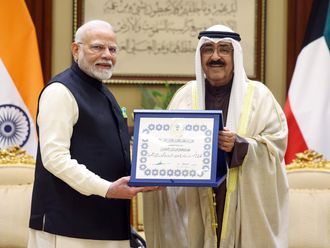Manila: President Donald Trump on Sunday offered to mediate in the South China Sea disputes, while his Chinese counterpart played down concerns over Beijing’s military build-up and the prospects of war in the contested waters.
Trump and Chinese President Xi Jinping spoke separately about the territorial rifts ahead of an annual summit of Southeast Asian nations that also includes the US, China and other global players. The disputes are expected to get the spotlight at the summit, along with the North Korean nuclear threat and terrorism.
The long-simmering disputes are one issue where the two major powers’ influence, focus and military might have been gauged, with the US and China both calling for a peaceful resolution but taking contrasting positions in most other aspects of the conflict.
Unlike China, the US is not a claimant to the potentially oil-rich and busy waters, but it has declared that it has a national interest in ensuring freedom of navigation and overflight and the peaceful resolution of the disputes. Several nations back an active American military presence in the region to serve as a counterweight to China’s increasingly assertive actions, including the construction of seven man-made islands equipped with military installations.
“I’m a very good mediator and arbitrator,” Trump said at a news conference with Vietnamese President Tran Dai Quang in Vietnam’s capital, Hanoi, before flying to Manila for the summit of the Association of Southeast Asian Nations.
Trump’s offer faces major obstacles. For one, China has steadfastly opposed what it calls US meddling in the disputes and has balked at the US Navy’s incursions into what Beijing considers its territorial waters in the South China Sea.
The Philippines, the head of Asean’s rotational chairmanship, said member states of the 10-nation regional bloc have to consult each other but thanked Trump for the offer.
“He is the master of the art of the deal but, of course, the claimant countries have to answer as a group or individually ... mediation involves all the claimants and nonclaimants,” Philippine Foreign Secretary Alan Peter Cayetano told reporters.
Philippine President Rodrigo Duterte said Xi, during a meeting in Danang, Vietnam, where they attended the annual Asia-Pacific Economic Cooperation forum this past week, assured him of China’s peaceful intentions in the strategic waterway, where Beijing, the Philippines, Vietnam and three other governments have overlapping claims.
When he raised concerns over China’s increasing military capability in the South China Sea, Duterte said Xi replied, “No, it’s nothing.”
“He acknowledged that war cannot be promoted by anybody, (that) it would only mean destruction for all of us,” Duterte told reporters after flying back to Manila. “He knows that if he goes to war, everything will blow up.”
The Chinese leader, however, would not back down on Beijing’s territorial claim, Duterte said, and justified his decision not to immediately demand Chinese compliance with a ruling by a UN-linked tribunal that invalidated China’s sweeping claims in the South China Sea on historical grounds.
China has dismissed that ruling as a “sham” and did not participate in the arbitration case that the Philippines filed during the administration of Duterte’s predecessor. Duterte took steps to thaw frosty relations with China after he won the presidency last year.
“If you go to the negotiating table and you start with the statement that I am here to claim validity of our ownership, you’re wasting your time. They will not talk about it,” Duterte said of China.
The Asean summit opens Monday under extra-tight security at a theatre and convention complex by Manila Bay. Duterte hosted a gala dinner Sunday for leaders including Trump, Russian Prime Minister Dmitry Medvedev, Chinese Premier Li Keqiang and Japanese Prime Minister Shinzo Abe, who all wore traditional barong shirts.
Riot police used shields and water hoses Sunday to push back hundreds of left-wing activists who tried to hold a protest at the US Embassy and carried placards that read “Ban Trump.” At least 20 protesters were injured in the brief scuffle and one was arrested, according to protest leaders, adding that the demonstrators dispersed after burning a mock US flag.
Japan’s Abe Meets Taiwanese Lawmaker Hours After Xi Warning
Japanese Prime Minister Shinzo Abe held a meeting with a Taiwanese politician Sunday, hours after Chinese President Xi Jinping warned him not to break with past consensus on what Beijing regards as a renegade province.
Abe held a 30-minute meeting with James Soong, head of the People First Party on the sidelines of the Asia-Pacific Economic Cooperation summit in Danang, Vietnam, according to Japan’s foreign ministry. After the meeting, the prime minister left for summits in the Philippines.
The meeting risks criticism from China even as Abe says he wants deeper cooperation on the threat from North Korea. In a summit with Xi the previous night, Abe received no clear response to a proposal that he visit China next year to mark the 40th anniversary of a friendship treaty.
Ties between China and Japan are less hostile than when Abe took office five years ago amid anger over a worsening territorial dispute. But he hasn’t succeeded in taking the chill off relations with his country’s biggest trading partner.
In the meeting, Abe told Soong that Taiwan was an important partner with shared values and close economic ties. Both sides agreed there had been progress in ties over the past year and Abe said he looked forward to further strengthening, while maintaining the unofficial nature of the relationship.
Xi told Abe on Saturday that the stable development of China-Japan ties was in the interest of both countries and that both sides should “work tirelessly to create conditions for the continued improvement of Sino-Japanese relations,” according to remarks published by the People’s Daily’s web portal.
Read about South Korean leader’s planned visit to China
“The key to improved Sino-Japanese relations lies in mutual trust,” Xi told his counterpart, urging Japan to deal with questions over history and Taiwan according to consensuses already reached by the two sides.











